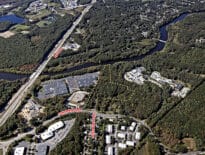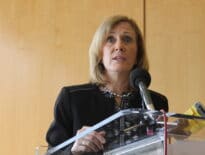Hundreds of millions of dollars for housing development, $50 million for lending in “disadvantaged” communities and $200 million for water and sewage infrastructure headline the investment areas in a $1.7 billion supplemental budget bill Gov. Charlie Baker outlined Wednesday as the Republican eyes more spending in his final months in office.
Baker will push to dip into the state’s booming tax surplus as revenues continue to smash expectations, calling for additional immediate investment in several areas he already targeted in longer-term borrowing bills geared toward economic development and infrastructure, particularly offshore wind.
Baker’s office summarized the bill in a press release but did not immediately provide a copy of the legislative text or bill number.
The bill also includes major boosts for equity priorities pushed by some in the real estate and banking industries. Baker’s latest midyear spending bill calls for steering $310 million toward housing development, including $200 million for unspecified “workforce housing” spending, $100 million to redevelop public housing in Boston, Cambridge, Salem and Worcester and $10 million to increase permanent supportive housing for those experiencing chronic homelessness.
Other spending proposals include $235 million on what Baker’s office described broadly as “transportation projects,” $200 million for Cape Cod water and sewer initiatives – critical to boosting the region’s critically low housing supply – $80 million to give small businesses more options to purchase commercial real estate, $50 million to offer financial assistance to developers from disadvantaged backgrounds looking to pursue large housing construction and $50 million to “de-risk lending to small business owners in underserved markets where access to capital is otherwise limited.” The banking industry has come under sustained criticism for making it difficult for many minority small and micro-business owners to access credit – sometimes perceived as a “risky” market segment – and its use of credit risk measurements that discriminate against people of color.
Wind Power Gets Focus
The midyear spending bill would also steer $100 million toward building outports in Salem, New Bedford and Somerset with an eye on the wind farms soon to come online off the coast of southeastern Massachusetts and other installations envisioned along the East Coast.
Vineyard Wind I, on track to become the first utility-scale offshore wind farm in the country, should come online in waters south of Martha’s Vineyard by the end of 2023, and several other projects are in development off the Bay State’s coasts.
But Baker warned Wednesday that Massachusetts runs the risk of missing out on the full potential of the offshore wind industry unless the legislature steers more funding toward the infrastructure it will require.
“We have a strong clean energy future here, but we can be doing so much faster if we can continue to support and invest in innovation, creativity, imagination and all the things that make Massachusetts special,” Baker, flanked by local leaders, deputies and industry representatives, said at an event at the Salem Wharf. “We have the resources to act. The supply chain issues are going to be there, the inflation issues will be there. What we need to do is create certainty for all the players who want to make these investments, put these dollars to work, and make Massachusetts at the front of the line instead of somewhere near the back of the line.”
All three of the communities that would receive port investments under Baker’s new spending bill already have ties to the offshore wind industry.
Vineyard Wind is based in New Bedford, and the company has also been working to transform Salem Harbor into what it has described as “the state’s second major offshore wind port.” Somerset’s Brayton Point is also poised to become home to the state’s first offshore wind manufacturing facility, where workers will build subsea transmission cables.
State Tax Haul Rises
The funding for port development in Baker’s latest midyear spending bill would complement billions of dollars earmarked for clean energy and environmental uses in the governor’s $3.5 billion economic development bill and his $9.7 billion infrastructure bill, both of which are being reviewed by legislative committees.
Baker unveiled his latest bill alongside an announcement that his administration would bump up its projected fiscal year 2022 state tax revenue haul to $37.67 billion, an increase of about $1.7 billion over the current estimate, after monthly collections have repeatedly blown past expectations.
“Because of these rising costs associated with inflation and supply chain issues and some labor issues in there as well, we anticipate that these conditions will only get worse over time, and that’s why this unprecedented surplus needs to be put to work now, so that we can get in and get going and get started at a price point that’s consistent with what most people believe these projects should cost,” Baker said. “The longer we wait to fund these projects, the longer we wait to break ground, the longer we wait to get going, the higher the costs of these projects will be and the farther back in line we’ll be.”




 |
| 


